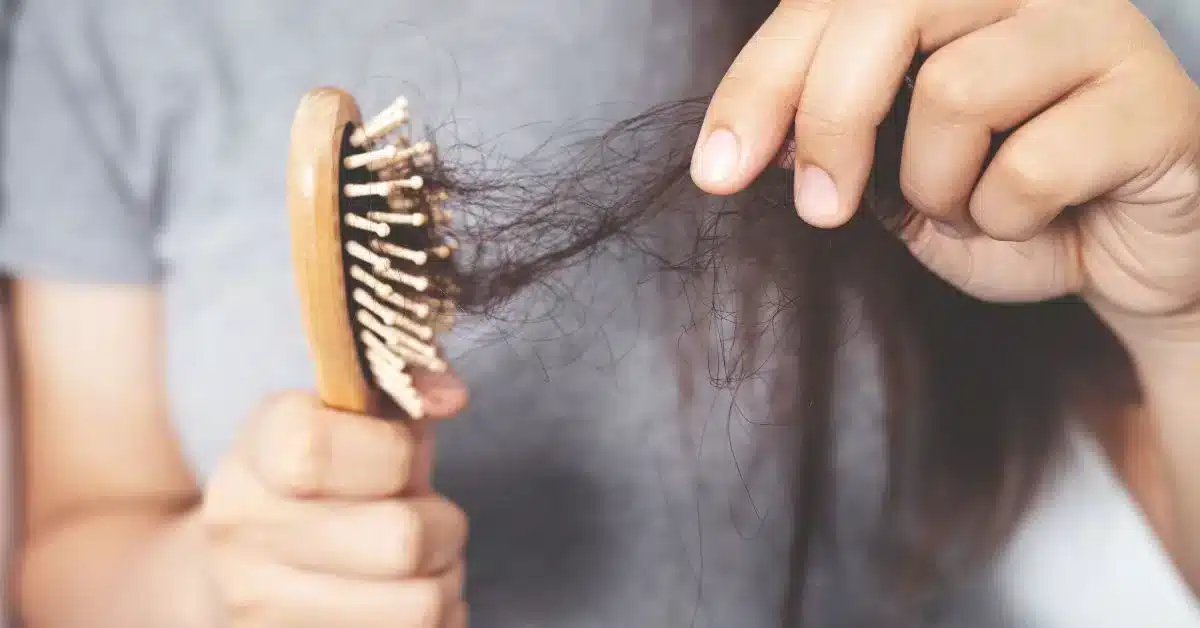What Causes Hair Thinning: Know the Risks Behind
We may notice our once thick and luscious locks thinning as we age.
Hair thinning is often associated with age but can result from many other factors like chemical products, tight hairstyles, etc.
According to the American hair loss association, more than 67% of men start experiencing hair thinning by age 35.
From genetics to lifestyle habits, understanding the causes of hair thinning is crucial for taking proactive steps to prevent further loss.
This article will explore what causes hair thinning.
Excessive use of chemical-laden hair products
Hair products such as shampoo or conditioner, rich in chemicals, can damage your hair.
These chemical-laden products contain hard surfactants that strip off hair’s moisture and natural oils.
This makes the hair dry, frizzy, and damaged with repeated use.
Tightly woven hairstyles
Tight hairstyles can cause Traction Alopecia, leading to permanent hair loss.
Constant tight ponytails or braids can cause hair breakage and hair fall, ultimately leading to thin spots over time.
Overtreating your hair

Chemical treatments, hair colors, perms, and overgrooming sessions on the hair can severely damage your hair leading to hair thinning.
These chemical treatments can separate the cuticle and make hair strands frizzy and dry.
The separated cuticle can cause hair thinning, leading to excessive hair loss.
Nutritional deficiency
A balanced diet is important for the healthy growth of hair.
Nutritional deficiencies of vitamins and minerals such as vitamin B, zinc, iron, and folic acid can cause hair thinning.
These deficiencies may affect hair structure and growth and lead to Telogen effluvium.
It is a type of hair loss disorder that, at the first stage, causes hair thinning.
Chronic stress
Chronic stress can cause hair thinning by disrupting the normal growth cycle of hair follicles.
Stress hormones like Cortisol and Adrenaline can prematurely push hair follicles into the resting phase, increasing hair shedding and thinning.
Chronic stress can also lead to inflammation in the scalp, damaging hair follicles and impairing their ability to produce healthy hair.
Hormonal disorders
Hormonal disorders can cause hair thinning by altering the levels of hormones in the body that regulate hair growth.
Conditions like PCOS and thyroid disorders can cause an imbalance in hormones like Androgens, Estrogen, and thyroid hormones, which affects the hair growth cycle.
In PCOS, high levels of Androgens can cause hair follicles to miniaturize and produce thinner hair.
Similarly, in thyroid disorders, imbalances in thyroid hormones can affect the hair growth cycle, leading to hair loss and thinning.
Hereditary hair loss
Hereditary hair loss is caused by genetic factors that make hair follicles sensitive to Dihydrotestosterone (DHT), a hormone derived from Testosterone.
In individuals with a genetic predisposition to Androgenetic alopecia, the hair follicles on the scalp gradually shrink in size over time, a process known as miniaturization.
This causes the hair shafts to become thinner and shorter with each growth cycle until the affected hair follicles stop producing new hair.
This leads to noticeable hair thinning and balding.
Postpartum hair thinning

Postpartum hair thinning is a common occurrence among women after giving birth.
During pregnancy, the increased levels of Estrogen hormones in the body can cause hair to remain in a growing phase, resulting in thicker and fuller hair.
However, after giving birth, Estrogen levels decrease, leading to a higher percentage of hairs entering the resting phase, which can result in hair loss or thinning.
This hair loss usually peaks around 3-4 months after delivery, but hair growth typically returns to normal within a year.
Adequate nutrition, stress reduction, and proper hair care can help minimize postpartum hair thinning.
Autoimmune disorders
Autoimmune disorders can cause hair thinning by attacking hair follicles as if they were foreign invaders, leading to hair loss called Alopecia areata.
The immune system mistakenly targets hair follicles, causing them to shrink and produce hair that is shorter and thinner than normal.
Rapid weight loss
Rapid weight loss can cause hair thinning.
When the body experiences sudden weight loss, it may enter a state of shock, affecting the hair growth cycle.
Additionally, rapid weight loss can lead to nutrient deficiencies, particularly protein, and biotin, which are essential for healthy hair growth.
This can result in weakened hair strands and hair thinning.
Conclusion
Hair thinning is a common condition that can be caused by a variety of factors, including nutritional deficiency, stress, or due to some underlying disorder.
Understanding the causes of hair thinning is essential for identifying effective treatments and preventing further hair loss.
Several lifestyle changes and hair care practices can help improve hair health and promote hair growth.
Consulting an expert can allow more personalized guidance and treatment options based on the specific cause of hair thinning.
Frequently Asked Questions
WowRx uses only high-quality sources while writing our articles. Please read our content information policy to know more about how we keep our content reliable and trustworthy.






